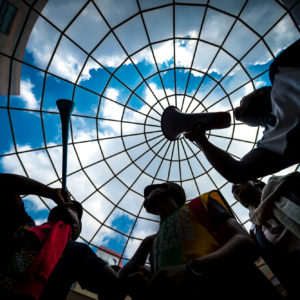Funding policy leaves students out in the cold
One of the financial aid scheme’s policies is denying tens of thousands of students funding in their final year of study, forcing them to drop out and putting their futures in jeopardy.
Author:
21 October 2021

A storm is brewing at many institutions of higher learning over the N+2 policy of the National Student Financial Aid Scheme (NSFAS). Under this policy, students who are funded by NSFAS have two additional years to finish their studies while receiving financial support.
The problem, though, is how it is applied. “I think the N+2 rule is unjust because it does not count the number of years NSFAS funded you. Instead, it counts the number of years you were in a higher institution, regardless of dropouts or any other [reasons for disrupted studies],” says Londeka Mbhele, 23, from Vryheid in KwaZulu-Natal.
The scheme says the rule is there to ensure students pass through the tertiary education system as quickly as possible, to create room for those coming behind them. But it has dire consequences for impoverished students.
Related article:
Mbhele was forced to drop out of the Durban University of Technology (DUT) this year when the N+2 rule made her ineligible for funding. Mbhele was in her final year of a three-year bachelor’s degree in information and communication technology.
She studied chemical engineering at the Mangosuthu University of Technology before enrolling at DUT. But she dropped out in 2018 after two years, having only received funding from NSFAS in her second year.
Medical time out
Nomfundo Buhlebuzile Mtshali, 27, is another final-year student who was forced to drop out of DUT because of the N+2 rule. From Mtubatuba in northern KwaZulu-Natal, Mtshali studied marketing communication at the Mangosuthu University of Technology in 2013. One of her high school teachers paid her registration fee.
She struggled financially until receiving a provident fund payout of R30 000 from the grocery store where her mother had worked before she died from cervical cancer in 2012. Mtshali then qualified for a bursary in 2014.
Mtshali paid her registration fee and attended classes until late February 2015, although she did not have funds and was rejected by NSFAS. Then the “toothache I had was seriously getting worse”. She spent two weeks in King George Hospital for wisdom teeth surgery in April, then recovered at home in May and June. “My lecturers were aware of the situation. I had submitted all the letters from the hospital, from the doctors I consulted and everything was up to date.”
Mtshali still had no funding when she returned to campus in July. So, she deregistered in August and worked “piece jobs”, including at a marketing company for three months.
Related article:
When Mtshali tried to register at Mangosuthu in 2016, she was “blocked” by the system because she apparently owed 2015 fees, had failed subjects and had exceeded the time frame allowed to complete her studies. Mtshali appealed to the registrar and was eventually “unblocked” in 2018. But now, she says, “the funds” were not available. “I was emotionally exhausted.”
She decided to start afresh and registered at DUT in 2019. It was the first time she had received funding from NSFAS as a first-year student. But Mtshali was then forced to drop out in her final year because “I exceeded N+2 enrolment”.
DUT senior director of corporate affairs Alan Khan says a NSFAS report said 530 students had lost their funding because of the N+2 rule and that all 2021 appeal outcomes were shared with the affected students.
“The NSFAS report had also stated that for the 2021 guidelines, there was no room to appeal for those exceeding N+2. However, DUT has been facilitating enquiries where we obtain enrolment reports from NSFAS and share these with students, so as to ensure that there is a better understanding of their exclusion,” Khan says.
Going to court
Sabelo Mtyana, 39, was in the final year of his bachelor’s degree in public administration at the University of Fort Hare in Alice, Eastern Cape, when NSFAS withdrew his funding under the N+2 rule. “Having my funding withdrawn unceremoniously struck me mentally. I slipped into depression in 2020 as a result. I was left destitute with no accommodation, no food and no financial support for basic needs, and no hope for paying off my tuition debt. All this during the hard lockdown, far from any friends or family who are based in Cape Town.”
Mtyana is one of a group of students who challenged the application of the N+2 rule in court. “After months of being rejected, many affected students gave up on the idea of studying as 2021 arrived. I had not stopped. I had written to the public protector for intervention. Around March this year, a law firm of young lawyers took our call, and after assessing our case they believed that we had a case. Because of time limitations and working against the clock for 2021 registration, Gama Attorneys with advocate Jazz Vilakazi filed for an urgent application.”
Related article:
But Mtyana says the case was struck off the roll because they did not meet the requirements for an urgent application.
He says they are not opposing the N+2 rule but asking that it count only the years that a student gets funding from NSFAS. “As a collective, we have always maintained the position that the rule is a necessary reinforcement for those students who sit in the system only to exploit it. However, counting years for which NSFAS did not pay is a violation of Section 29 of the Constitution and a project that works against the gains of accessible free education,” Mtyana says.
Here to stay
“The N+2 rule for university students will continue to be based on the number of years in higher education rather than the number of years funded,” NSFAS spokesperson Kagisho Mamabolo says. “The rationale for the rule being applied in this way is based on the principle that NSFAS is assisting students to achieve their first qualification.
“There is also a fairness element to this. If the number of years funded are counted, a student who is funded from their first year will have to complete their qualification within the required time frames for that qualification. However, a student who is funded from their third year of study, for example, may in fact benefit from additional years to complete their qualification.”
Related article:
Minister of Higher Education Blade Nzimande said on 9 June 2020 that final-year students who exceeded the N+2 rule would graduate in 2020. But Mamabolo says: “The provision introduced by the minister in June 2020 was a once-off relief for final-year affected students … This was never meant to be a new policy.”
Mamabolo adds that 66 170 continuing students and 27 317 new applicants had their funding withdrawn for the 2021 academic year for exceeding the N+2 rule.
The University of Fort Hare had not responded to questions by the time of publication.




